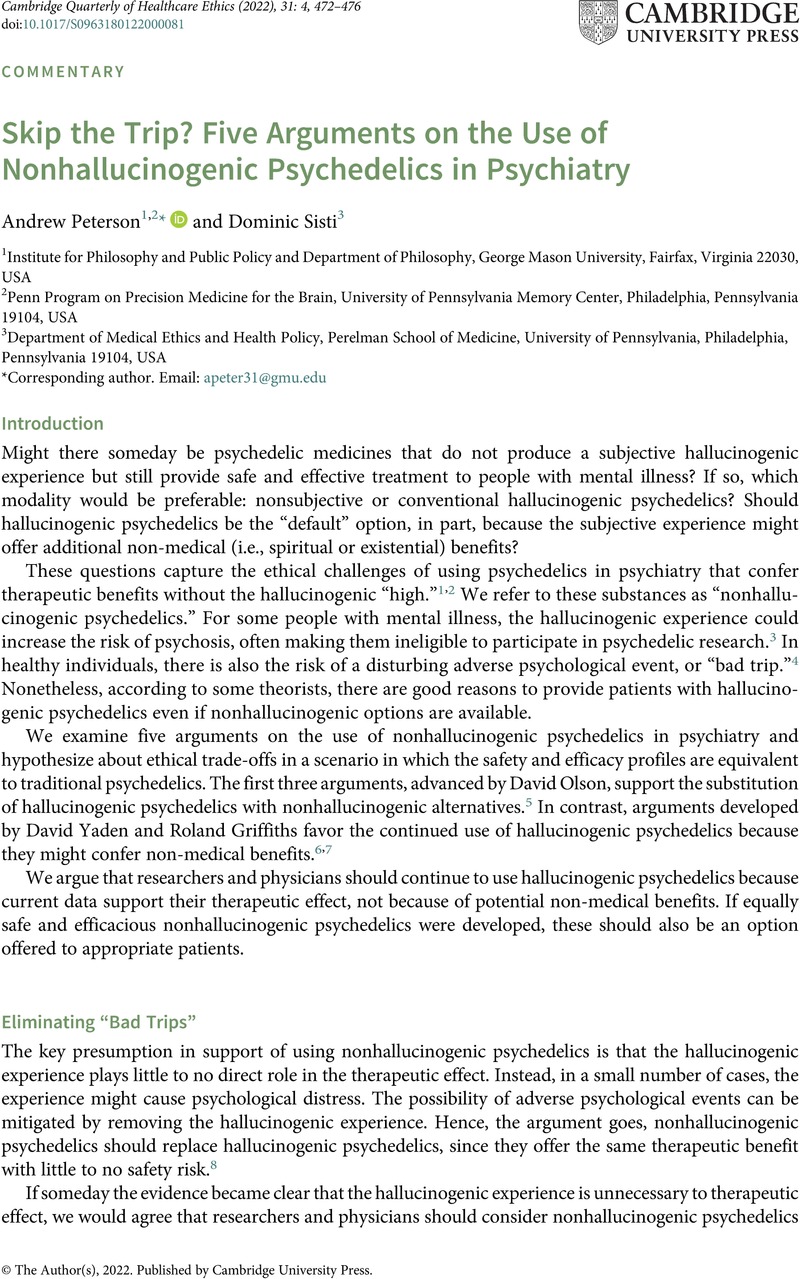Article contents
Skip the Trip? Five Arguments on the Use of Nonhallucinogenic Psychedelics in Psychiatry
Published online by Cambridge University Press: 18 November 2022
Abstract

- Type
- Commentary
- Information
- Copyright
- © The Author(s), 2022. Published by Cambridge University Press
References
Notes
1. DARPA. Structure-guided drug design could yield fast-acting remedies for complex neuropsychiatric conditions. DARPA 2011 Sept; available at https://www.darpa.mil/news-events/2019-09-11 (last accessed 17 Feb 2022).
2. Shayla L. Can a trip-free psychedelic still help people with depression? Vice Magazine 2019 Nov; available at https://www.vice.com/en/article/pa748k/psilocybin-for-depression-and-the-world-of-non-hallucinogenic-psychedelics (last accessed 17 Feb 2022).
3. Johnson, MW, Richards, WA, Griffiths, RR. Human hallucinogen research: Guidelines for safety. Journal of Psychopharmacology 2008;22(6):603–20.CrossRefGoogle ScholarPubMed
4. Carbonaro, TM, Bradstreet, MP, Barrett, FS, MacLean, KA, Jesse, R, Johnson, MW, et al. Survey study of challenging experiences after ingesting psilocybin mushrooms: Acute and enduring positive and negative consequences. Journal of Psychopharmacology 2016;30(12):1268–78CrossRefGoogle ScholarPubMed.
5. Olson, DE. The subjective effects of psychedelics may not be necessary for their enduring therapeutic effects. ACS Pharmacology & Translational Science 2020;4(2):563–7CrossRefGoogle Scholar.
6. Yaden, DB, Griffiths, RR. Ethical issues regarding non-subjective psychedelics as standard of care. Cambridge Quarterly of Healthcare Ethics 2022; 31(4):464–71.CrossRefGoogle Scholar
7. Yaden, DB, Griffiths, RR. The subjective effects of psychedelics are necessary for their enduring therapeutic effects. ACS Pharmacology & Translational Science 2020;4(2):568–72CrossRefGoogle ScholarPubMed.
8. See note 5, Olson 2020.
9. Ross, S, Bossis, A, Guss, J, Agin-Liebes, G, Malone, T, Cohen, B, et al. Rapid and sustained symptom reduction following psilocybin treatment for anxiety and depression in patients with life-threatening cancer: A randomized controlled trial. Journal of Psychopharmacology 2016;30(12):1165–80CrossRefGoogle ScholarPubMed.
10. Carhart-Harris, RL, Bolstridge, M, Day, CM, Rucker, J, Watts, R, Erritzoe, DE, et al. Psilocybin with psychological support for treatment-resistant depression: Six-month follow-up. Psychopharmacology 2018;235(2):399–408 CrossRefGoogle ScholarPubMed.
11. Carhart-Harris, R, Giribaldi, B, Watts, R, Baker-Jones, M, Murphy-Beiner, A, Murphy, R, et al. Trial of psilocybin versus escitalopram for depression. New England Journal of Medicine 2021;384(15):1402–11CrossRefGoogle ScholarPubMed.
12. Bogenschutz, MP, Forcehimes, AA, Pommy, JA, Wilcox, CE, Barbosa, PC, Strassman, RJ. Psilocybin-assisted treatment for alcohol dependence: A proof-of-concept study. Journal of Psychopharmacology 2015;29(3):289–99CrossRefGoogle ScholarPubMed.
13. Marschall, J, Fejer, G, Lempe, P, Prochazkova, L, Kuchar, M, Hajkova, K, van Elk, M. Psilocybin microdosing does not affect emotion-related symptoms and processing: A preregistered field and lab-based study. Journal of Psychopharmacology 2022;36(1):97–113 CrossRefGoogle Scholar.
14. See note 5, Olson 2020.
15. See note 3, Johnson et al. 2008.
16. Iltis, AS, Misra, S, Dunn, LB, Brown, GK, Campbell, A, Earll, SA, et al. Addressing risks to advance mental health research. JAMA 2013;70(12):1363–71Google ScholarPubMed.
17. See note 5, Olson. 2020.
18. Golden, TL, Magsamen, S, Sandu, CC, Lin, S, Roebuck, GM, Shi, KM, Barrett, FS. Effects of setting on psychedelic experiences, therapies, and outcomes: A rapid scoping review of the literature. In: Current Topics in Behavioral Neurosciences. Berlin, Heidelberg: Springer; 2022 Google Scholar. doi:10.1007/7854_2021_298. Published online ahead of print 10 Feb 2020.
19. See note 6, Yaden DB, Griffiths RR. 2022.
20. Anderson, BT, Danforth, A, Grob, C. Psychedelic medicine: Safety and ethical concerns. Lancet Psychiatry 2020;7(10):829–30CrossRefGoogle ScholarPubMed.
21. See note 6, Yaden DB, Griffiths RR. 2022.
- 3
- Cited by




